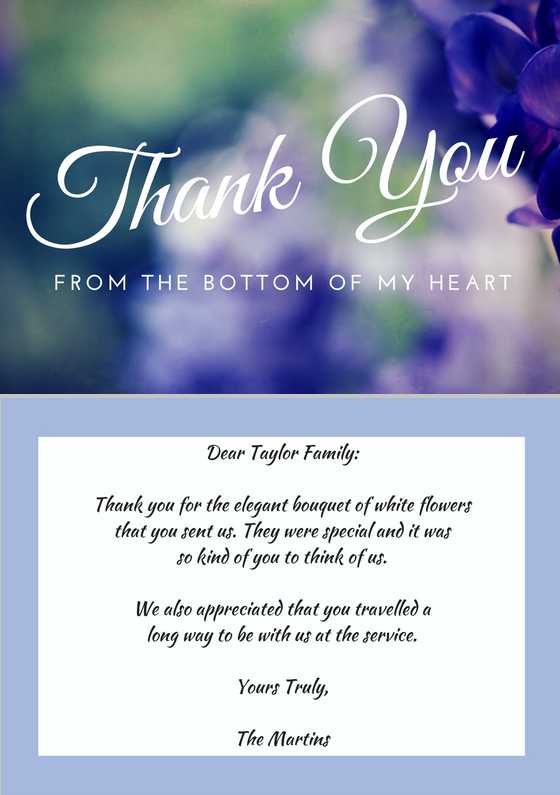In the profound sorrow that follows the loss of a loved one, the world can often feel overwhelming and unfocused. Amidst the grief and the countless arrangements, the outpouring of love and support from friends, family, and community members can be a true source of comfort. These thoughtful gestures, whether it’s a comforting hug, a shared memory, a delicious meal, or a generous donation, provide much-needed strength during an incredibly difficult time.
While your heart is heavy and your mind preoccupied with remembrance, there often comes a point where you wish to express your gratitude to those who stood by you. A simple “thank you” can convey so much, acknowledging their kindness and letting them know their support made a difference. It’s a way to close a chapter of immediate needs and begin the quieter process of healing, recognizing the warmth that surrounded you.
This is where the task of crafting memorial service thank you wording comes into play. It might seem daunting, but it doesn’t have to be. The most important thing is sincerity, and even a few well-chosen words can beautifully convey your appreciation. We understand the sensitivity of this moment and are here to offer guidance and inspiration to help you articulate your thanks with grace and heart.
Navigating Gratitude: When and How to Express Thanks After a Memorial Service
Expressing thanks after a memorial service is a deeply personal act, a way to acknowledge the community of support that gathered around you during your time of loss. It’s not just a social obligation, but a genuine expression of your appreciation for the empathy and kindness extended. These small gestures of gratitude can be incredibly meaningful to both the sender and the receiver, reinforcing the bonds of care that exist.
There’s often a question about the “right” time to send thank you notes. The truth is, there isn’t a strict deadline, and patience is key. While some aim to send them within a few weeks to a couple of months after the service, remember that grief follows its own timeline. If it takes you longer, that is perfectly understandable and acceptable. Your loved ones will appreciate the sentiment whenever it arrives, understanding the immense challenges you’ve faced. Focus on what feels right for you and your family.

Deciding who to thank involves a thoughtful review of everyone who contributed to your comfort and the remembrance of your loved one. This typically includes those who sent flowers, made monetary donations in memory, provided food or practical help (like childcare or running errands), offered a comforting presence at the service, or shared heartfelt condolences. Also consider the officiant, pallbearers, or anyone who performed a special role during the service.
When it comes to the actual wording, personalization is paramount. While templates can be helpful starting points, try to include a specific reference to the kind act they performed. For instance, instead of just “thank you for your kindness,” you might say, “Thank you for the beautiful lilies; they truly brightened the room,” or “We deeply appreciate you sharing that wonderful story about [loved one] at the reception.” This level of detail shows you noticed and valued their particular gesture.
Handwritten notes remain the most traditional and cherished form of thank you. The effort of putting pen to paper conveys a personal touch that emails or texts, while convenient, often lack. However, for very close friends or in circumstances where your energy is truly depleted, a heartfelt phone call or a sincere email can also be appropriate. The medium is less important than the genuine emotion behind your message.
Ultimately, the act of writing and sending these notes can also be a quiet part of your own healing process. It allows you to reflect on the love and support you’ve received, finding moments of gratitude amidst your sorrow. It’s a gentle reminder that even in the darkest times, there is light in the kindness of others, and acknowledging that light can be a small step forward in your journey.
Heartfelt Memorial Service Thank You Wording Ideas for Different Situations
When crafting your messages, remember that a sincere heart is the most eloquent speaker. These samples are designed to offer a starting point, which you can then adapt and personalize to reflect your unique relationship with the recipient and your specific sentiments. Don’t be afraid to modify them to truly resonate with your feelings.
- For flowers or a sympathy gift: “Thank you for the beautiful flowers. They brought a moment of peace and a lovely fragrance to our home during a difficult time.”
- For a donation in memory: “We are so touched by your generous donation to [charity name] in [loved one’s name]’s memory. It means so much to know their legacy will continue to help others.”
- For specific help or service: “We are incredibly grateful for your help with [specific task, e.g., organizing the reception / looking after the children]. Your support was invaluable and truly lifted a burden from us.”
- For attendance and comforting presence: “Thank you for joining us at [loved one’s name]’s memorial service. Your presence and warm embrace brought us immense comfort.”
- For a shared memory or story: “Thank you for sharing your wonderful memory of [loved one’s name] with us. Hearing that story brought a smile to our faces and reminded us of their joyful spirit.”
- For general comfort and support: “We deeply appreciate your kindness and unwavering support during this heartbreaking time. Your thoughtfulness has been a true source of strength for our family.”
- From the entire family: “The [Family Name] family extends our heartfelt thanks for your sympathy and support. Your love has been a great comfort to us all.”
- For a close friend who offered continuous support: “Thank you for being such a constant presence and source of strength. We couldn’t have navigated these past weeks without your steady friendship.”
- For someone who traveled a long distance: “We know you traveled a great distance to be with us, and your effort truly touched our hearts. Thank you for making the journey to honor [loved one’s name].”
- For clergy or officiant: “Thank you for officiating [loved one’s name]’s service with such grace and compassion. Your words were a true comfort and a beautiful tribute.”
- For musical contribution: “Your musical performance at the service was incredibly moving and a fitting tribute to [loved one’s name]. Thank you for sharing your talent with us.”
- For practical help during the service: “We are so thankful for your assistance with [ushering / greeting guests / setting up]. Your practical help allowed us to focus on remembering [loved one’s name].”
In these moments of profound grief, expressing your gratitude, however simple, serves as a powerful testament to the bonds of human connection. It acknowledges the kindness and compassion that surrounds you, transforming individual acts of support into a collective embrace. Remember that there is no right or wrong way to feel or to express your thanks; what truly matters is the genuine sentiment behind your words.
As you navigate this difficult chapter, allow yourself grace and time. The act of writing these notes can be a small, quiet step in your healing journey, a moment to reflect on the warmth and love that still exists even in sorrow. May you find peace in your memories and strength in the enduring kindness of those around you.


